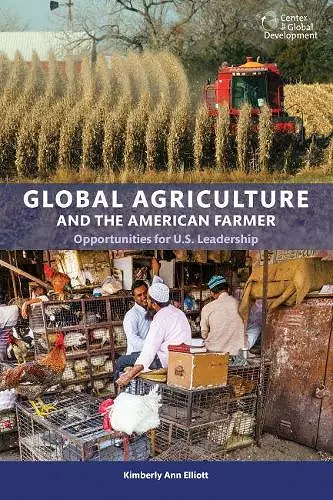Global Agriculture and the American Farmer
Opportunities for U.S. Leadership
Format:Paperback
Publisher:Center for Global Development
Published:30th Jun '17
Should be back in stock very soon

The United States is one of the world's largest producers and exporters of a range of agricultural commodities, so U.S. policies have big effects on global food security and other global public goods linked to agriculture. On the positive side of the ledger, President Obama created the Feed the Future aid initiative to promote agricultural development in poorer countries as a tool to achieve the global goals of ending hunger and extreme poverty, which are mostly rural. But that generosity is undercut by U.S. support for farmers and livestock producers that suppresses global prices for developing country producers, increases food market volatility, increases greenhouse gas emissions, and contributes to the spread of antibiotic-resistant bacteria.
In this book, Elliott focuses on three policy areas that are particularly damaging for developing countries: traditional agricultural subsidy and trade policies that support the incomes of American farmers at the expense of farmers elsewhere; the biofuels mandate, which in its current form increases market volatility while doing little if anything to mitigate climate change; and weak regulation of antibiotic use in livestock. While noting that broad reforms are needed to fix these problems, Elliott also identifies practical steps that U.S. policymakers could take in the relatively short run to improve farm policies for American taxpayers and consumers as well as for the poor and vulnerable in developing countries.
It has long been recognized that American farm policy is costly and inefficient and helps large farmers much more than smaller ones. In this work, Kim Elliott shows that these same policies are harmful to the poor, especially poor farmers, in developing countries and suggests ways that harm could be reduced.”- Anne Krueger, Senior Research Professor, Johns Hopkins School of Advanced International Studies; Senior Fellow, Stanford Center for International Development;
“Due to its size and influence, U.S. farm and food policy has international—even global—impact. Kim Elliott's book is an important examination of how 'domestic' policy translates into the lives of people around the world, especially poor farmers and consumers in developing countries. It demonstrates clearly that achieving the Sustainable Development Goals, especially ending poverty and hunger, isn't just poor countries, but also requires changes in developed countries as well.”- Rayond C. Offenheiser, President Oxfam America;
“Kim Elliott has written an important book. It provides an unflinching and honest examination of the oftentimes contradictory agriculture policies of the United States. She spares few avenues as she explains how U.S. policies toward climate, health, trade, food security, and development often fall short and are undermined by 'do as I say, not as I do' policies that run at cross purposes to the goals of those programs. Her book is an uncomfortable look at past and present U.S. agricultural policy, but it also provides an optimistic guide to how the U.S. can provide global leadership in the future.”- Joseph W. Glauber, Senior Research Fellow, International Food Policy Research Institute; former Chief Economist, U.S. Department of Agriculture
ISBN: 9781933286983
Dimensions: unknown
Weight: 280g
184 pages